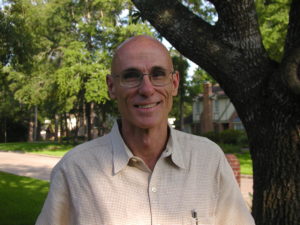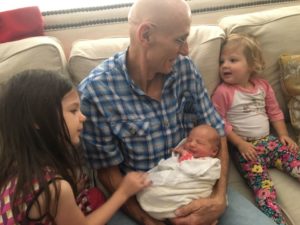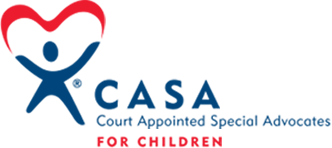August 2022 Advocate Spotlight: Ron Finch
 We invite you to meet Ron Finch, nominated by Case Supervisor Kristy O’Neal.
We invite you to meet Ron Finch, nominated by Case Supervisor Kristy O’Neal.
“Ron has been with us since early 2017,” Kristy said. “He has been assigned to 12 cases, including his current two cases, which are complicated. Ron works on his advocacy almost daily. He excels in medical and educational advocacy and meets all of the minimum expectations. He incorporates TBRI coaching in his cases when possible. He is also a strong role model of positive child interactions to families experiencing behavior issues. In addition to being an Advocate, Ron is also part of the Bike Guys team and pitches in whenever the office needs a volunteer.”
We asked Ron to share about his experiences as an Advocate.
Is there anything unique about your background that contributes to your approach to advocacy?
While my wife and I were raising our five children, I served for 20 years as an advocate for an adult with an intellectual disability. He was completely dependent on a Texas-administered Medicaid program. Just like in Child Protective Services, everyone has a large caseload. As a volunteer who was focused on one person, I was in a position to make a difference in his life.
How did you become interested in volunteering as AN aDVOCATE?
In the mid ’80s, before CASA came to Texas, my mother volunteered to be a court watcher. She was supervised by an attorney who intervened in select child abuse cases, the ones that made the news. It was always very bad news. I attended some of the meetings and have been interested in volunteering in some capacity ever since. It feels like I have always known I would be doing this after I retired.
Did you have any reservations about volunteering?
Sure, that is normal, but I had plenty of time to think about it. On the first day of my retirement, I was sipping coffee at La Madeleine with the CASA recruiting manager.
Explain in your own words the work you do as a CASA aDVOCATE. Why is it important for a child in care?

Once I get to know the child, having visited with them a few times and reviewed records, I want to sit back and think about what is missing and what else can be done. I find that I like to research family lineage. It’s like a treasure hunt. Plus, it helps when talking to the child’s family when you already know parts of the family tree. From the child’s viewpoint, they like when I bring a little project that we can do together and when we play together. I’m not sure who has more fun with that.
What has surprised you most about your aDVOCACY work?
I was surprised at how consequential our work can be. It is very gratifying when we can introduce a family member to the CPS caseworker at the Family Group Conference and then see that person ultimately become an important part of the child’s life.
What has been the most difficult aspect of being a casa? Most rewarding?
In difficult cases, it’s hard to know which is the least bad option. At the end of a case, it is most rewarding when I can see the child thriving in a good home.
What would you like the community to know about children in care?
Many children who come into care have parents who were also traumatized as children. We can reduce child abuse and neglect by supporting policies that increase income and educational opportunities as well as physical and mental health-care access for at-risk families.
What have you learned about children in care?
The children who come into care have the potential to learn and to heal. People working in the system are encouraged to identify their needs and their strengths. Too often, meeting their needs while building on their strengths is hampered by the lack of nurturing caregivers, therapists, and other providers of the services they need.
Is there a particular moment or memory that stands out for you?
The two boys were ages 8 and 13. After about four months in an emergency shelter, they were moved to a foster home one week before summer break. Getting no return calls from the intermediate school, I went to the campus. The older child had failed too many of his final tests and was to be retained in seventh grade. After speaking with the principal about his situation, he was promoted to eighth grade. From there, I drove to the foster home and gave him the news. I will never forget the smile he gave me that day. By the way, he did fine in eighth grade.
EVERY CHILD DESERVES A CHANCE … IT’S YOU!
Learn more about becoming a CASA volunteer: VOLUNTEER or give online DONATE
